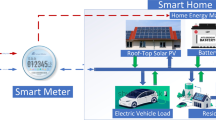Abstract
In recent years, micro combined cooling, heating and power generation (mCCHP) systems have attracted much attention in the energy demand side sector. The input energy of a mCCHP system is natural gas, while the outputs include heating, cooling and electricity energy. The mCCHP system is deemed as a possible solution for households with multiple energy demands. Given this background, a mCCHP based comprehensive energy solution for households is proposed in this paper. First, the mathematical model of a home energy hub (HEH) is presented to describe the inputs, outputs, conversion and consumption process of multiple energies in households. Then, electrical loads and thermal demands are classified and modeled in detail, and the coordination and complementation between electricity and natural gas are studied. Afterwards, the concept of thermal comfort is introduced and a robust optimization model for HEH is developed considering electricity price uncertainties. Finally, a household using a mCCHP as the energy conversion device is studied. The simulation results show that the comprehensive energy solution proposed in this work can realize multiple kinds of energy supplies for households with the minimized total energy cost.
Similar content being viewed by others
References
Rifkin J. The Third Industrial Revolution: How Lateral Power Is Transforming Energy, the Economy, and the World. New York: Palgrave MacMillan, 2011
Krause T, Andersson G, Fröhlich K, Vaccaro A. Multiple-energy carriers, modeling of production, delivery, and consumption. Proceedings of the IEEE, 2011, 99(1): 15–27
Geidl M, Koeppel G, Favre-Perrod P, Klockl B, Andersson G, Frohlich K. Energy hubs for the future. IEEE Power & Energy Magazine, 2007, 5(1): 24–30
Badea N. Design for Micro-combined Cooling, Heating and Power Systems: Stirling Engines and Renewable Power Systems. London: Springer, 2014
Xie D, Lu Y, Sun J, Gu C H, Yu J L. Optimal operation of networkconnected combined heat and powers for customer profit maximization. Energies, 2016, 9(6): 442
Xie D, Lu Y, Sun J, Gu C, Li G. Optimal operation of a combined heat and power system considering real-time energy prices. IEEE Access: Practical Innovations, Open Solutions, 2016, 4: 3005–3015
Du P W, Lu N. Appliance commitment for household load scheduling. IEEE Transactions on Smart Grid, 2011, 2(2): 411–419
Chen C, Wang J, Kishore S. A distributed direct load control approach for large-scale residential demand response. IEEE Transactions on Power Systems, 2014, 29(5): 2219–2228
Zhang D, Shah N, Papageorgiou L G. Efficient energy consumption and operation management in a smart building with microgrid. Energy Conversion and Management, 2013, 74: 209–222
Bozchalui M C, Hashmi S A, Hassen H, Canizares C A, Bhattacharya K. Optimal operation of residential energy hubs in smart grids. IEEE Transactions on Smart Grid, 2012, 3(4): 1755–1766
Rastegar M, Fotuhi-Firuzabad M, Lehtonen M. Home load management in a residential energy hub. Electric Power Systems Research, 2015, 119: 322–328
Tasdighi M, Ghasemi H, Rahimi-Kian A. Residential microgrid scheduling based on smart meters data and temperature dependent thermal load modeling. IEEE Transactions on Smart Grid, 2014, 5 (1): 349–357
Brahman F, Honarmand M, Jadid S. Optimal electrical and thermal energy management of a residential energy hub, integrating demand response and energy storage system. Energy and Building, 2015, 90: 65–75
Energy Saving Advice Service. The benefits of micro-CHP. 2016–02–16, http://www.energysavingtrust.org.uk/domestic/micro-chp
Houwing M, Negenborn R R, De Schutter B. Demand response with micro-CHP systems. Proceedings of the IEEE, 2011, 99(1): 200–213
Lu N. An evaluation of the HVAC load potential for providing load balancing service. IEEE Transactions on Smart Grid, 2012, 3(3): 1263–1270
Wang J H, Zhai Z Q, Jing Y Y, Zhang C F. Particle swarm optimization for redundant building cooling heating and power system. Applied Energy, 2010, 87(12): 3668–3679
Fanger P. Thermal Comfort. Copenhagen: Danish Technical Press, 1970
He P. The study about indoor air conditioning based on PMV. Dissertation for the Master’s Degree. Chongqing: Chongqing University, 2010
ISO Standard 7730. Moderate thermal environment-determination of PMV and PPD indices and specification of the condition for thermal comfort, 1984
Soyster A L. Convex programming with set-inclusive constraints and applications to inexact linear programming. Operations Research, 1973, 21(5): 1154–1157
Bertsimas D, Sim M. The price of robustness. Operations Research, 2004, 52(1): 35–53
Bertsimas D, Thiele A. Robust and data-driven optimization: modern decision-making under uncertainty. 2012–10–15, http://web.mit.edu/dbertsim/www/papers/Robust%20Optimization/Robust%20and%20data-driven%20optimization-%20modern% 20decision-making%20under%20uncertainty.pdf
Acknowledgements
This work is jointly supported by the National Natural Science Foundation of China (Grant No. 51477151), and National Key Research and Development Program of China (Basic Research Class) (No. 2017YFB0903000).
Author information
Authors and Affiliations
Corresponding author
Rights and permissions
About this article
Cite this article
Zhang, H., Zhang, C., Wen, F. et al. A comprehensive energy solution for households employing a micro combined cooling, heating and power generation system. Front. Energy 12, 582–590 (2018). https://doi.org/10.1007/s11708-018-0592-9
Received:
Accepted:
Published:
Issue Date:
DOI: https://doi.org/10.1007/s11708-018-0592-9




